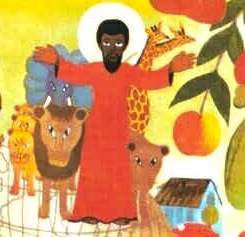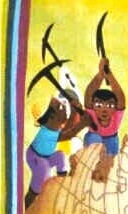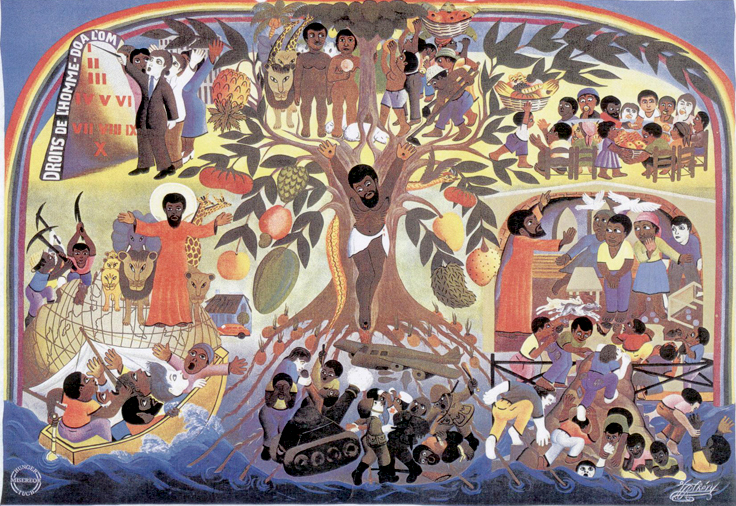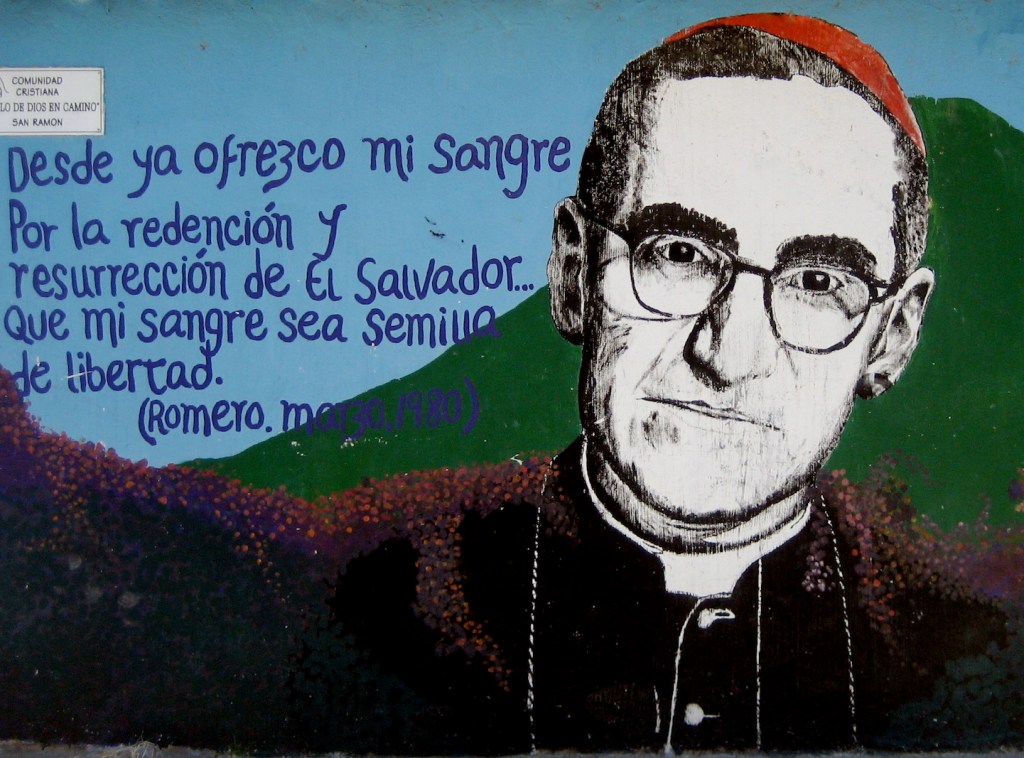And they were all filled with the Holy Spirit and began to speak in different tongues, as the Spirit enabled them to proclaim… the mighty acts of God.”
Acts 2:1-11
At the core of the Christian worldview is a contradiction; a contradiction that is highlighted in the liturgical readings for the feast of Pentecost and one that is profoundly visible in the life of Oscar Romero  who was beatified this weekend. Joseph (Cardinal) Cardijn (1882-1967), the founding chaplain of the Young Christian Worker movement, described this contradiction as a tension between the truth of life and the truth of faith.
who was beatified this weekend. Joseph (Cardinal) Cardijn (1882-1967), the founding chaplain of the Young Christian Worker movement, described this contradiction as a tension between the truth of life and the truth of faith.
Truth of Life: This is the reality of a divided world; a post-Babel (GN 11:1-9) world torn apart by sin, factionalism, suffering, and marginalization. This is the context of the oppressed people of El Salvador at the time of Romero’s assassination. This is the reality that Pope Francis describes so powerfully in his exhortation Evangelii Gaudium:
we have to remember that the majority of our contemporaries are barely living from day to day, with dire consequences. A number of diseases are spreading. The hearts of many people are gripped by fear and desperation, even in the so-called rich countries. The joy of living frequently fades, lack of respect for others and violence are on the rise, and inequality is increasingly evident. It is a struggle to live and, often, to live with precious little dignity” (EG 52)
 If we take the time to look at the reality of life (of the crucifixion), from the conflict in Syria to economic inequalities in urban America, it is tempting to become like the apostles and fearfully withdraw from the world behind locked doors (JN 20:19). What can any of us do, we may ask, in the face of powerful and complex oppressive forces? Why would I want to hear about the suffering of others? Why should I care?
If we take the time to look at the reality of life (of the crucifixion), from the conflict in Syria to economic inequalities in urban America, it is tempting to become like the apostles and fearfully withdraw from the world behind locked doors (JN 20:19). What can any of us do, we may ask, in the face of powerful and complex oppressive forces? Why would I want to hear about the suffering of others? Why should I care?
Unfortunately the suffering of so many people in the world is reinforced and supported by attitudes of passivity, what Pope Francis describes as the “globalization of indifference.” Just because we are more interconnected, does not mean we care more about others. Suffering, oppression, fear, indifference, these are all central parts of our present reality—the reality of a broken world.
Truth of Faith: But this is not the whole story. The Christian  worldview also includes a hopeful vision of salvation, healing, and redemption—what Cardijn described as the truth of faith. Like the Hebrew prophets who were filled by the Holy Spirit, the preaching of Jesus proclaimed that another world is possible. Oppressive, exploitative and divisive social arrangements are not inevitable nor are they reflective of God’s will. Blessed Romero knew this well as he preached God’s Kingdom and called for conversion across his divided nation.
worldview also includes a hopeful vision of salvation, healing, and redemption—what Cardijn described as the truth of faith. Like the Hebrew prophets who were filled by the Holy Spirit, the preaching of Jesus proclaimed that another world is possible. Oppressive, exploitative and divisive social arrangements are not inevitable nor are they reflective of God’s will. Blessed Romero knew this well as he preached God’s Kingdom and called for conversion across his divided nation.
Followers of Christ are called to proclaim God’s Kingdom, which is best captured by the Book of Isaiah’s image of the peaceable kingdom (Is. 11:1-10) and the Gospel of Luke’s frequent depiction of a great banquet, where inequalities disappear and the oppressed will be nourished (e.g., Lk. 14:15-24).
Truth of Action: Of course, there is a gap or a contradiction between the truth of life and the truth of faith. To profess a belief in the Kingdom of God without modeling the values of that reality in the present can only lead to a crisis. How can we pray “thy Kingdom Come, Thy Will be Done” and not be uncomfortable with the status quo?
 So what to do with this contradiction? Here is where a third truth, the truth of action emerges. To be truly Christian, we must be people of action, working to transform the realities of the present age to be more in line with the values embodied by God’s kingdom.
So what to do with this contradiction? Here is where a third truth, the truth of action emerges. To be truly Christian, we must be people of action, working to transform the realities of the present age to be more in line with the values embodied by God’s kingdom.
Herein lies the power of Pentecost and God’s gift of the Spirit. Upon the reception of the Holy Spirit, the followers of Christ are liberated from their fears. They are no longer passive or afraid to confront the institutions of power. Instead, they go out to the peripheries, to proclaim God’s Kingdom and initiate new relationships of reconciliation and communion. We are called, like the apostles and Blessed Oscar Romero, to organize for the Kingdom. We are called to join together and take action.
In order to transform the present reality to be more in line with God’s Kingdom, individual acts of charity are not enough. Real social change in a world marked by structural sin, conflict and inequality demands organized efforts, what Cardijn described as the truth of action. Romero knew this very well. And it is arguably his call for the Christians of El Salvador to organize for the Kingdom that led to his martyrdom.
Assisted and inspired by the Holy Spirit and the gospel mission,  Christian social movements and church organizations, in many forms, are going forth into the world to act for justice, peace, and the integrity of creation. But even with the success of these Structures of Grace (that I detail in my recent book) far more action is needed to overcome social sin.
Christian social movements and church organizations, in many forms, are going forth into the world to act for justice, peace, and the integrity of creation. But even with the success of these Structures of Grace (that I detail in my recent book) far more action is needed to overcome social sin.
It is not enough to passively receive the Holy Spirit without going out to the peripheries to serve others. It is not enough to honor the prophets of the Kingdom, like Romero or Dorothy Day, without acting for God’s Kingdom in our own lives. And it’s not enough to simply act by ourselves. The gift of the Holy Spirit challenges us to act in effective ways for the common good. From the struggle for civil rights to the efforts at building peace, experience tells us that the most effective way to bring about positive social change is through communities and social movements actively engaged in changing the structures of society. So, on this Pentecost, how are we doing in responding to the gifts of the Holy Spirit to heal a world broken by sin? How do we join with others in movements and communities for social change?


You must be logged in to post a comment.